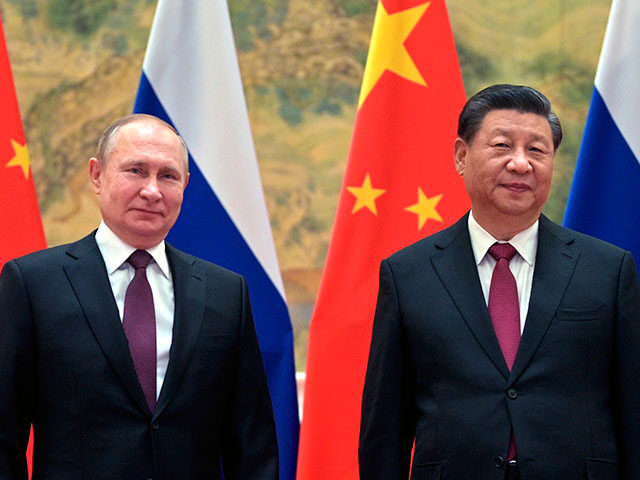A senior official from the Iran-backed Houthi terrorist army of Yemen told Russian media Friday that Russian and Chinese ships can pass safely through the Red Sea without fear of attack.
The Houthis have largely shut down the vital Red Sea shipping lane by attacking vessels under all other flags with drones, missiles, and hijacking squads.
RELATED VIDEO — Biden Co-Chair Coons: I “Hope” We “Find a Way to Deter Iran,” We’ll Need to Do More on Houthis:
Houthi official Mohammed al-Bukhaiti told Russia’s Izvestia newspaper that the Houthis are targeting ships headed for, owned by, or linked to Israel.
“As for all other countries, including Russia and China, their shipping in the region is not threatened,” he claimed. “Moreover, we are ready to ensure the safe passage of their ships in the Red Sea, because free navigation plays a significant role for our country.”
The Houthis have, in fact, targeted ships with no connection whatsoever to Israel, so their claims about careful targeting have little credibility, but they would probably refrain from hitting Chinese or Russian vessels, as both nations are allied with their patrons in Tehran.
Bukhaiti vowed that terrorist attacks on shipping would continue despite limited U.S. and British airstrikes against Houthi missile launch sites.

Houthi fighters and tribesmen stage a rally against the U.S. and the U.K. strikes on Houthi-run military sites near Sanaa, Yemen, on Sunday, January 14, 2024. (AP Photo)
Another Houthi spokesman, Mohammed Abdulsalam, told Reuters on Friday that ships from Saudi Arabia and the United Arab Emirates (UAE) would not be targeted, even though those countries intervened in Yemen’s civil war in 2015 to fight against the Houthis. He called on the Saudis and Emiratis to support the Houthis and “reject the militarization of the Red Sea,” a reference to the U.S.-led Operation Prosperity Guardian intended to protect shipping.
“We do not want the escalation to expand. This is not our demand. We imposed rules of engagement in which not a single drop of blood was shed or major material losses. It represented pressure on Israel only, it did not represent pressure on any country in the world,” Abdulsalam insisted.
“What the Yemeni people did in the beginning was to target Israeli ships heading to Israel without causing any human or even significant material losses, just preventing ships from passing as a natural right. Now, when America joined in and escalated the situation further, there is no doubt that Yemen will respond,” he said.
WATCH — Pentagon: “No Indications” Houthis Will Stop Attacking:
“We do not want the conflict to expand in the region and we do not prefer that, and we are still working on non-escalation, but the decision is up to the Americans, as long as they continue to attack,” he threatened.
The Houthis are not the legitimate government of Yemen and, even if they were, they would not have any “natural right” to conduct terror attacks against ships in international waters.
On Thursday, the U.S. Central Command (CENTCOM) confirmed another attack. The Houthis fired two anti-ship ballistic missiles at a tanker called MV Chem Ranger that was flagged in the Marshall Islands, owned by Americans, and operated by a Greek firm.
“The crew observed the missiles impact the water near the ship. There were no reported injuries or damage to the ship. The ship has continued underway,” CENTCOM said.
CENTCOM also said Thursday that U.S. forces “conducted strikes on two Houthi anti-ship missiles that were aimed into the Southern Red Sea and were prepared to launch.”
The missiles were destroyed in self-defense after U.S. forces “determined they were an imminent threat to merchant vessels and U.S. Navy ships in the region.”

COMMENTS
Please let us know if you're having issues with commenting.